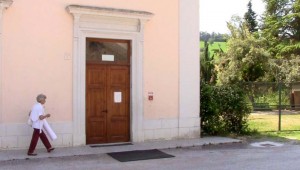A retired teacher continues her life’s calling, having refused to let the authorities shut down her former train station school.
TRASANNI, Italy – Maria Carobini, 69, spends her days tending to the delicate grains growing in the small orchard of the Station School, a school that just four years ago she was fighting to save. That fight was a community-wide revolution.
The Station School was originally a train station in the early 20th century. Then it established itself as an elementary school for immigrant children. Today it stands tall and pale pink with large navy shutters missing from some of the windows, but still alive with student learning.
Carobini taught at the Station School for 20 years before government law forced her to retire.
But she continued to teach an interesting array of classes such as gardening, nutrition and flaute dolce (an instrument similar to the recorder) to her beloved students.
“The most important thing is that here the pupils learn to observe,” she says. “By observing, they become curious and in my opinion curiosity is a great teacher.”
A conflict between the school and government arose shortly after Carobini’s retirement in 2008. The Station School did not have enough students enrolled to meet the government’s quota and therefore officials wanted to shut it down.
Carobini says that the notices about the Station School closing were sent only to the parents, not to the teachers or local residents. What the authorities didn’t realize was how strongly the families and staff felt about the Station School as a school for the community.
Carobini and friends would not take this sitting down. They would fight, even though the odds were against them. Carobini seems a lot tougher on the inside than her petite frame suggests. Her spirit is one that constantly seeks justice.
[pullquote]I am very proud of taking the sides of the weakest people all the time.[/pullquote]
“I am very proud of taking the sides of the weakest people all the time,” she says.
A committee of outraged teachers and parents was formed in 2008. They called themselves the Beehive. Just like bees in a hive work all together and are very protective of their hive, the teachers and parents would go to great lengths to protect their school. They all stood strong and united for their cause.
Antonio Cipollini, 70, another volunteer teacher at the Station School as well as President of the Beehive, recalls writing many requests to local administrations. “I wanted to talk to them but they all rejected my proposals.”
The Beehive took the matter to higher authorities.
“We protested with posters and banners to create scandal and get press coverage,” says Carobini, who knows firsthand how much the Station School means to her community.

A grain of wheat growing in the orchard of the Station School which will eventually be harvested by the students.
“The school is a property of the whole village. It is not only useful to current students, but to future generations.”
The aim of the Beehive was to tug at the authorities heartstrings by showing them exactly why the Station School is so special. It served a largely immigrant community that might feel lost or neglected if bused to another, larger school, one without the kind attention they get at the Station School.
“Italy is becoming more multi-cultured,” Cipollini says. “People think immigrants are a handicap to the cultural level, but really they improve it.”
Stories and pictures of the Station School were published to create buzz. “I asked newspapers and journalists to help us fight our battle,” Carobini says. The Beehive then created a petition that received over 800 signatures in favor of keeping the school open.
When authorities saw the significance the school had to so many people, they allowed it to remain open for two more years.
Four years have passed, and the Station School has been left alone by the government. With the efforts of Carobini, Cipollini and the community, the Station School seems to have been saved.
Asked about the future of the school, Carobini and Cipollini agreed on needing an improved method of teaching, considering the children of the school come from all different cultures.
[pullquote]People should have relationships with one another,” Cipollini says. “The village should not just be sleeping quarters.[/pullquote]
They also wish the local people could be more collaborative. “People should have relationships with one another,” Cipollini says. “The village should not just be sleeping quarters.”
So unifying a multicultural community is Carobini’s next goal. She will continue to fight in her own ardent way. In the meantime, Carobini can be found doing some of her favorite things – walking through the countryside, studying plants and teaching her students.
“The thing I’m most proud of is having helped people in trouble,” Carobini says. “Everyone has the right to be helped.”
Multimedia
